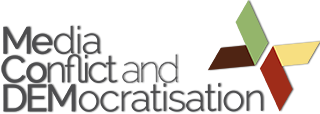A working paper on theorising democratisation conflicts by Christian Christensen is now online!
Download at: http://www.mecodem.eu/publications/working-papers
Executive Summary
The purpose of this paper is to provide a conceptual framework for considering the role of ICTs (broadly defined) within democratisation conflicts. The ultimate purpose of the project, ‘Media, Conflict and Democratisation’ is to investigate the role of traditional media and ICTs in conflicts that accompany and follow transitions to democracy. The focus of the project is on four areas of contentious politics: (1) citizen politics and identities, (2) political power and accountability (3) elections and (4) transitional justice.
- The potential use of ICTs for communication management is at the forefront of the thinking for this paper, in which existing policy initiatives in relation to ICTs for conflict resolution will be addressed. It is important to note, however, that the role of ICTs in exacerbating conflict (and not simply ICTs in conflict resolution) will also be addressed.
- We review a number of reports and studies in which the use of ICTs in relation to democratisation and transition are addressed. Two things emerged from these studies that are noteworthy: first, socio-political context was discussed as a key factor in understanding the role of technology; and, second, relatively little mention was made regarding the inter-relationship(s) between ICT/social media and established mainstream media or alternative media outlets.
- A brief overview follows of three critical perspectives on technology in relation to social and political change: (1) Technology Discourse, (2) Technological Constructivism, and (3), Liberation Technology/Technologies of Liberation. These three areas have been chosen because they provide intellectual frameworks for considering (in a critical fashion) the relationship between technology, information and emancipation; and, in addition, how these definitions and operationalisations could potentially impact broader social understanding(s) of the affordances of contemporary social networking technologies.
- In the final section of the paper an attempt is made to connect ICT use in democratisation conflicts with what we might call ‘mainstream’ media use (newspapers, magazines and radio), and to do so without falling into the trap of techno-determinism or techno-utopianism. This is done through a presentation of the concepts of ecology, technologies of deliberation as an inter-connected theoretical framework for understanding this new, more complex inter-relationship.
- These theoretical frameworks dovetail with a number of the common recommendations made by the reports presented in the early part of the paper, particularly with regards to understanding ICT use within specific local contexts. The concept of media ecology is particularly useful in this respect, as the relationship between ICT use/content and mainstream news coverage is a major factor in the media democratisation project. An empirically-grounded understanding of the relative level of disintermediation within particular ecologies will be crucial to developing suggestions for future policy, as well as an understanding of how positive or negative deliberation does (or does not) evolve within those ecologies.
